This latest limited run of THE PIRATES OF PENZANCE had its final Performance on December 30, 2018.
NYGASP’s next New York production will take place March 1 through March 3, 2019, Ô of a double bill of one act operettas: AGES AGO written in 1869 by Sir. W.S. Gilbert and Mr. Frederic Clay and the 1893 Savoy Comic Opera, MR. JERICO by Messrs. Harry Greenbank and Ernest Ford.
Classical Comedy is Serious Business.
A review of the New York Gilbert and Sullivan Players’ (NYGASP) revival of
THE PIRATES OF PENZANCE or, The Slave of Duty
At the Kaye Playhouse
December 29, 2018
by Moshe Bloxenheim, Guest Reviewer
It is a tribute to their dual devotion to the Savoy Operas and the art of stagecraft that The New York Gilbert and Sullivan Players manage to come across as fresh and vibrant in their latest production of the 1879 classic THE PIRATES OF PENZANCE. While NYGASP sticks close to the classic idea of the production (with its double edged sword of “Traditional Performance”) they mine the original material for its inherent humor and entertainment value as if it were the latest new minted show.
Sir W.S. Gilbert’s plot for THE PIRATES OF PENZANCE takes on the obligations of Duty (with a capital “D”) and runs amok with it. Due to a misunderstanding, Frederic had been signed on as a Pirate Apprentice by his nursemaid Ruth until he reached his 21st year. At that point Frederic announces his intention not merely to leave Piracy, but to follow his Duty (capitalized “D”) and destroy his mentors – an engagingly loopy band of cutthroats who cannot bring themselves to harm any orphan and who are now making a poor living in a world where ALL their possible victims claim to be orphans. Leaving with the good wishes of his former guardians, Frederic – having never met any other women at sea – questions Ruth on whether she will be an ideal woman for him. Ruth’s assurances are wasted when her former charge discovers the pretty young daughters of Major-General Stanley. Angrily sending Ruth away, Frederic tries to win over one of the charming young ladies only to have them all spurn him except for the dazzling Mabel. The ensuing highly musical moment of joy, love and chaperonage is interrupted by the returning Pirates who seize the entire group. Just as the Pirates are about carry these well-bred ladies off and – horror of horrors! – marry them, Major General Stanley arrives and uses his ingenuity to prevent such a rash act of mass matrimony. Soon Frederic joins up with the rather timid local Constabulary with the aim of eliminating the Pirates. All seems to be going Frederic’s way when the Pirate King and Ruth drop in and reveal a technicality in our heroes terms of Apprenticeship that plays upon Frederic’s sense of Duty (with the same capital “D”) and gets him back in their power.
Remember though – this is a COMIC Opera – and though there may be the threat of lovers parted for years and a dire pirate vengeance, all will end happily for everybody.
Sir Arthur Sullivan’s music is first rate – especially when one realizes that he had left his original work at home in London and had to recompose most of the score for the world premiere in New York City – and he and Sir W.S. Gilbert show their brilliant range from the lush and rollicking piratical “Oh, Better Far to Live and Die” to the sly excesses of Frederic’s “Oh, Is There Not One Maiden Breast” and Mabel’s operatic “Poor Wandering One”. Composer and Librettist fully understand that songs on their own can be funny, sad or romantic but they also prove themselves experts in the wit of context; such as the Major General’s hilariously pastoral “Sighing Softly to The River” while surrounded by hidden pirates and policemen in Act Two.
The cast consisting of pirates, policemen, daughters, nursemaid and Major General are marvelous with never a false step. They are all personalities, not merely mobile stage settings or musical window dressing.
In appearance and vocal abilities, Mr. Carter Lynch is as dreamy a Frederic as any Mabel could wish for. An excellent actor, Mr. Lynch truly grasps the humor of his role and never loses sincerity no matter what naiveté or extreme idealism Frederic must exhibit.
The attractive Ms. Kate Dixon is a perfect Mabel. A delight on the ear, she brings out the heroic and comic drama of operatic new love and matches Frederic with the earnestness of her feelings.
Mabel’s sisters are all appealing and whether they are celebrating the seaside or urging unwilling officers to “death and glory”, Mss. Hannah Holmes, Amy Maude-Helfer and Merrill Grant truly shine as the siblings Edith, Kate and Isabel.
Ruth’s attempts to keep Frederic for herself could possibly make her the villainess of THE PIRATES OF PENZANCE. Fortunately, Ms. Angela Christine Smith’s deft and comic portrayal of this nursemaid-turned-pirate shows her as an unsuccessful, yet highly likeable opportunist who is a joy to listen to.
Exhibiting pleasing vocal power together with a stylish sword wielding dignity, Mr. Matthew Wages cuts considerable dash as the Pirate King, making the most of his contradictory position of a truly nice man in a not so virtuous career.
The timid and nervous Sergeant of Police is another contrast of a man in an unlikely line of work. Mr. David Auxier makes him a memorable and downright hilarious character, exhibiting some highly amusing reactions and footwork.
As part of the excellent ensemble of policemen, Mr. Louis Dall’Ava has his own highly diverting moments as the one officer who does everything wrong even when he is in the right.
Mr. James Mills is downright endearing in the role of the Pirate Lieutenant, Samuel. His Samuel is the pirate who tries to keep things in some sort of order and even express unwelcome truths.
In the role of Major General Stanley, Mr. David Macaluso is a treat. Like his colleagues he never lets his portrayal slip no matter how absurd the situation: whether he is acting out the phrases of his classic introductory patter song, “I am The Very Model of a Modern Major General” or executing his fanciful Act Two pas-de-deux with pirates and policemen in attendance, Mr. Macaluso ensures that it is the Major General who is being sublimely silly, not he.
Conductor Albert Bergeret leads his admirable orchestra and singers with a masterful hand and, together with Mr. David Auxier, directs the show with a joyful zest. The two directors recognize that THE PIRATES OF PENZANCE is a cartoon, but they make sure to remind us what the show is parodying as well: villains and heroes who are more talk than action, overqualified incompetents, romantic idealists, and so on… This is what keeps a work that premiered nearly 140 years ago as present and successful as ever.
The choreography is part of the fun and Mr. Bill Fabris celebrates the moments and characters staging the Piratic horseplay, the schoolgirl glee of young ladies let loose on a seaside and the musical theater riff that is slipped into “With Cat-Like Tread” in Act Two. Whether staging ensemble pieces or the more intimate numbers, like Mabel and Frederic’s “Stay Frederic, Stay,” Mr. Fabris shows a skilled touch.
Ms. Lou Anne Gilleland’s scenic designs of the seashore and the ruined chapel are fine settings and Ms. Gail J. Wofford and Mr. Quinto Ott’s costumes are quite picturesque as well, ranging from the eccentric garments of the pirates to the bouffantly bustled daughters of Major General Stanley. All are suitably lit by Mr. Benjamin Weill’s atmospheric lighting.
Rapidly paced shows always make me appreciate the efforts backstage and considering the rather frantic action of THE PIRATES OF PENZANCE, kudos must be given to Production Stage Manager, Joshua Strone and Assistant Stage Manager Annette Dieli who ensure an apparently seamless frenzy onstage.
People go to THE PIRATES OF PENZANCE expecting musical silliness and NYGASP ensures an abundance of merriment, but they also make you admire both the work that provides the amusement and the artistry needed to deliver it so successfully.

I am a computer programmer, wannabe writer who loves theater and just got into the habit of inflicting my theatrical opinions.
I live in New York.Moshe can be reached at MB1224@aol.com
###########




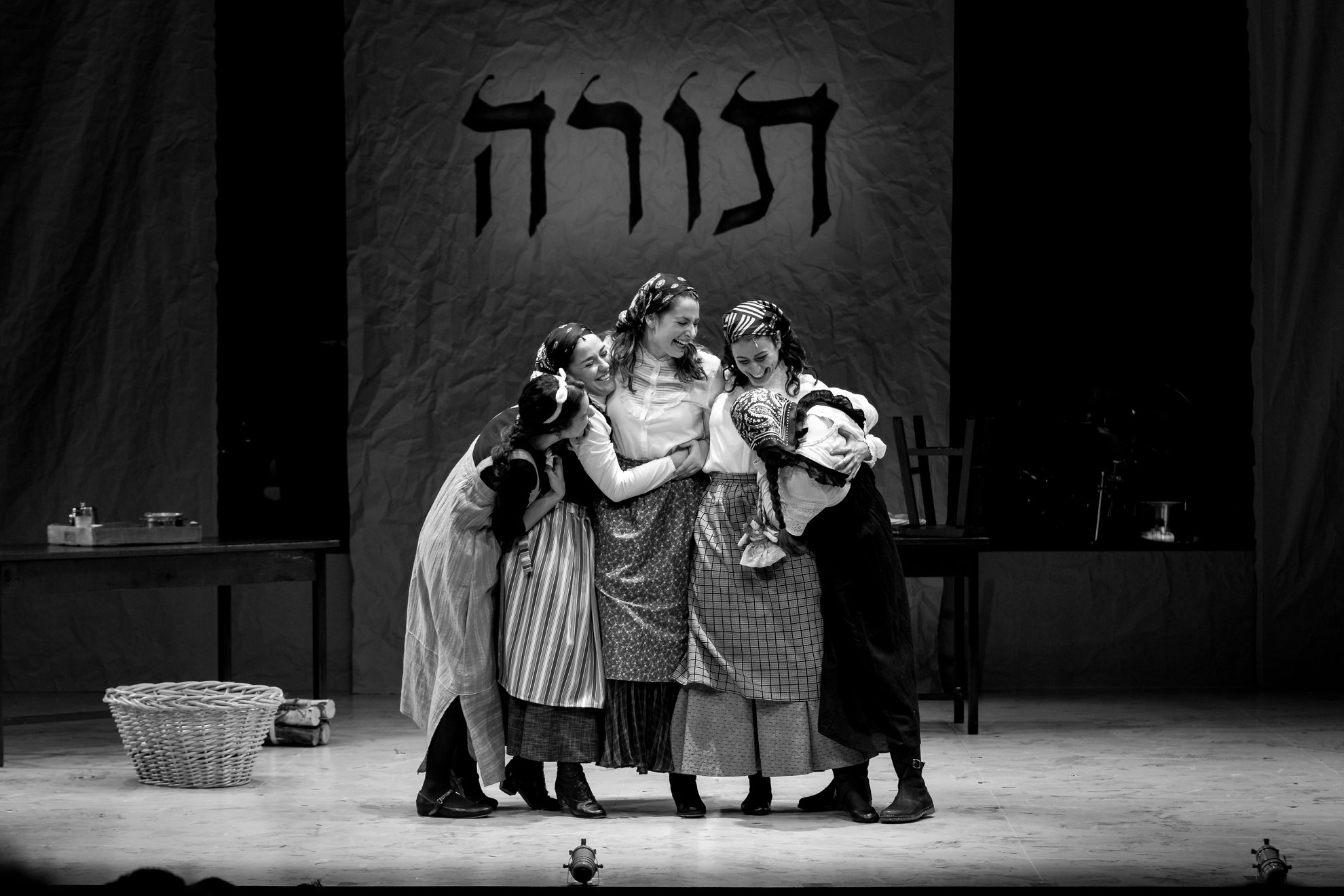



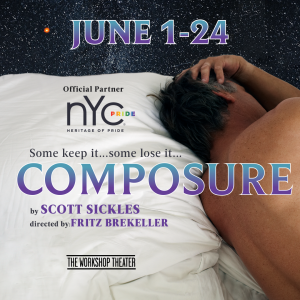
 The sounds of the student’s rehearsal of ROMEO AND JULIET provide a surprisingly fitting commentary on the adult’s events onstage as the play’s themes of doomed love, mishandled information, exile, etc., constantly resurface throughout COMPOSURE. In addition, Mr. Sickles’ love of language wittily permeates COMPOSURE, capitalizing on both the modern scenario and the parallel us of Shakespearean text.
The sounds of the student’s rehearsal of ROMEO AND JULIET provide a surprisingly fitting commentary on the adult’s events onstage as the play’s themes of doomed love, mishandled information, exile, etc., constantly resurface throughout COMPOSURE. In addition, Mr. Sickles’ love of language wittily permeates COMPOSURE, capitalizing on both the modern scenario and the parallel us of Shakespearean text. Jeff’s ex-wife Amanda thought she had Jeff’s devotion but is now forced to confront the realities of their failed marriage and the need to stop looking back.
Jeff’s ex-wife Amanda thought she had Jeff’s devotion but is now forced to confront the realities of their failed marriage and the need to stop looking back. 







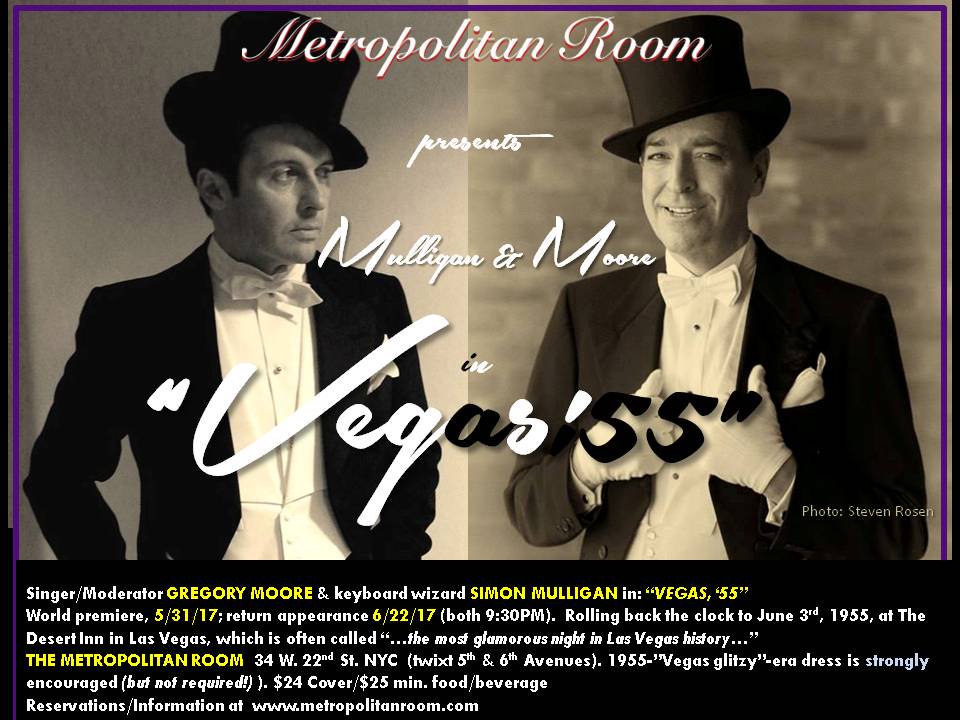

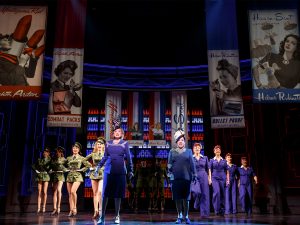 Act Two shows the competing heads of the cosmetics and beauty industry, Miss Elizabeth Arden and Madame Helena Rubinstein, having survived Governmental hearings and the Food and Drug Administration’s investigations into their product lines. All seems bleak until the outbreak of war causes an increased demand for cosmetics and a need for technologies that are patriotically developed and supplied by both Mme. Rubinstein and Miss Arden’s companies. The Postwar boom places the two ladies in what seem to be unassailable positions in the cosmetics market. After a few years, the business changes as new competitors seek out the youth market, use new forms of advertising and sell product lines that our heroines deem tasteless and shoddy. Miss Elizabeth Arden and Mme. Helena Rubinstein must then face being figures of the past with shrinking empires who cannot adapt because their pride and high standards will not let them come to terms with a rapidly changing trade and radically different concepts of beauty. The ladies must also live with the effects that their drive and determination have left on their personal lives.
Act Two shows the competing heads of the cosmetics and beauty industry, Miss Elizabeth Arden and Madame Helena Rubinstein, having survived Governmental hearings and the Food and Drug Administration’s investigations into their product lines. All seems bleak until the outbreak of war causes an increased demand for cosmetics and a need for technologies that are patriotically developed and supplied by both Mme. Rubinstein and Miss Arden’s companies. The Postwar boom places the two ladies in what seem to be unassailable positions in the cosmetics market. After a few years, the business changes as new competitors seek out the youth market, use new forms of advertising and sell product lines that our heroines deem tasteless and shoddy. Miss Elizabeth Arden and Mme. Helena Rubinstein must then face being figures of the past with shrinking empires who cannot adapt because their pride and high standards will not let them come to terms with a rapidly changing trade and radically different concepts of beauty. The ladies must also live with the effects that their drive and determination have left on their personal lives. her husband and merchandising assistant Tommy Lewis chafes at the fact that he is his wife’s subordinate and cannot be a public part of MISS Arden’s success. To add to her worries, her competitor Madame Helena Rubinstein has returned from Europe and has repurchased the American wing of the firm she had sold off before the 1929 stock market crash. Mme. Rubinstein is zealously developing new products and treatments and her assistant Harry Fleming is eagerly providing new ideas to reestablish her cosmetics as a necessary luxury. Unfortunately he too is beginning to feel that his work is not being properly appreciated. Deep in the throes of competition new alliances are forged, relationships severed and the ladies bring the FDA down upon the entire cosmetics industry.
her husband and merchandising assistant Tommy Lewis chafes at the fact that he is his wife’s subordinate and cannot be a public part of MISS Arden’s success. To add to her worries, her competitor Madame Helena Rubinstein has returned from Europe and has repurchased the American wing of the firm she had sold off before the 1929 stock market crash. Mme. Rubinstein is zealously developing new products and treatments and her assistant Harry Fleming is eagerly providing new ideas to reestablish her cosmetics as a necessary luxury. Unfortunately he too is beginning to feel that his work is not being properly appreciated. Deep in the throes of competition new alliances are forged, relationships severed and the ladies bring the FDA down upon the entire cosmetics industry. As Miss Arden’s nemesis, Ms. Patti LuPone brilliantly creates a fierce and dominating Helena Rubinstein who has never left her past, in part because she knows that no one else will let her forget who she is: a Jew and a woman. She too must battle to keep ahead and she feels that every cosmetic advance she can create is hers and hers alone even if she hires the brightest people to help market her products. There are times when Ms. LuPone’s take on her character’s Polish/Yiddish accent (by way of Australia, London and Paris) defeats her intelligibility, but all vocal confusions are forgiven whenever Ms. LuPone lands a number. In the End of Act Two, Helena sings “Forever Beautiful”, a number about trying to stop time with art that could have easily been a tribute to a woman’s self-absorption and mania as a collector of her own portraits, but Ms. LuPone makes it a touching appreciation of a woman who is facing the end of her life without any of the consolations of love and family.
As Miss Arden’s nemesis, Ms. Patti LuPone brilliantly creates a fierce and dominating Helena Rubinstein who has never left her past, in part because she knows that no one else will let her forget who she is: a Jew and a woman. She too must battle to keep ahead and she feels that every cosmetic advance she can create is hers and hers alone even if she hires the brightest people to help market her products. There are times when Ms. LuPone’s take on her character’s Polish/Yiddish accent (by way of Australia, London and Paris) defeats her intelligibility, but all vocal confusions are forgiven whenever Ms. LuPone lands a number. In the End of Act Two, Helena sings “Forever Beautiful”, a number about trying to stop time with art that could have easily been a tribute to a woman’s self-absorption and mania as a collector of her own portraits, but Ms. LuPone makes it a touching appreciation of a woman who is facing the end of her life without any of the consolations of love and family.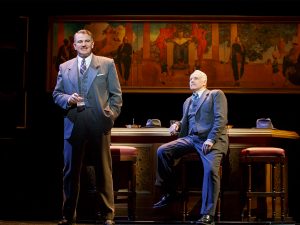 Similarly, Mr. Douglas Sills gives an admirable performance as Harry Fleming, a man who thinks he deserves more credit than Madame will give anyone. There is humor and much pathos in the fact that these two individuals can be so interchangeable in the lives of Mme. Rubinstein and Miss Arden that when they end up leaving these ladies both gentlemen merely switch bosses and much continues as before (which makes one wonder how intelligent Lewis and Fleming really are if they think the other lady would give them any more recognition – but who am I to quibble with a reality that does make for a darned good plot twist?). When watching Messrs. John Dosetti and Douglas Sills play these roles so expertly, I just kept imagining Director Michael Greif saying “You are the embodiment of all the emasculated men in the lives of these ladies.” A surprising highlight was their number “Dinosaurs” sung by the gentlemen at the end of their careers as they see their bosses and their companies being left behind by the youth culture and changes in fashion. Of course, after some of the really bad advice they both give their bosses in Act One (which brings on the FDA) I wondered why anyone would keep listening to them.
Similarly, Mr. Douglas Sills gives an admirable performance as Harry Fleming, a man who thinks he deserves more credit than Madame will give anyone. There is humor and much pathos in the fact that these two individuals can be so interchangeable in the lives of Mme. Rubinstein and Miss Arden that when they end up leaving these ladies both gentlemen merely switch bosses and much continues as before (which makes one wonder how intelligent Lewis and Fleming really are if they think the other lady would give them any more recognition – but who am I to quibble with a reality that does make for a darned good plot twist?). When watching Messrs. John Dosetti and Douglas Sills play these roles so expertly, I just kept imagining Director Michael Greif saying “You are the embodiment of all the emasculated men in the lives of these ladies.” A surprising highlight was their number “Dinosaurs” sung by the gentlemen at the end of their careers as they see their bosses and their companies being left behind by the youth culture and changes in fashion. Of course, after some of the really bad advice they both give their bosses in Act One (which brings on the FDA) I wondered why anyone would keep listening to them.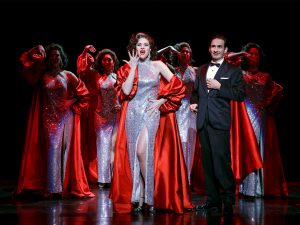 Mr. Erk Liberman’s Charles Revson is fine as a determined though unpolished male parallel to Miss Arden and Mme. Rubinstein and Ms. Steffanie Leigh is memorably eye-catching as Dorian Leigh. They also perform other people in the in the world of our two Ladies as do the rest of the superb company: Most notably Ms. Mary Ernster who summons up the best of Helen Hokinson’s Dowager cartoons from the New Yorker.
Mr. Erk Liberman’s Charles Revson is fine as a determined though unpolished male parallel to Miss Arden and Mme. Rubinstein and Ms. Steffanie Leigh is memorably eye-catching as Dorian Leigh. They also perform other people in the in the world of our two Ladies as do the rest of the superb company: Most notably Ms. Mary Ernster who summons up the best of Helen Hokinson’s Dowager cartoons from the New Yorker.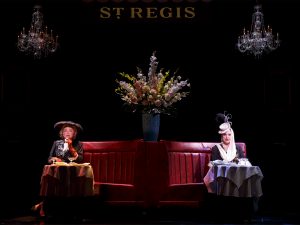 Elizabeth and Helena exhibit a dignity and maturity that does not allow for much in the way of high kicks and twirls, so Choreographer Christopher Gattelli makes them the center of a world that dances around them, creating some very imaginative numbers such as “Best Face Forward” an overview of how cosmetics can affect a woman’s world and “Step on Out” where Tommy Lewis and Harry Fleming both have a night out to blow off steam in their different (yet similar) ways.
Elizabeth and Helena exhibit a dignity and maturity that does not allow for much in the way of high kicks and twirls, so Choreographer Christopher Gattelli makes them the center of a world that dances around them, creating some very imaginative numbers such as “Best Face Forward” an overview of how cosmetics can affect a woman’s world and “Step on Out” where Tommy Lewis and Harry Fleming both have a night out to blow off steam in their different (yet similar) ways. Admittedly, the sets and costumes are well worth showing off. Mr. David Corin has come up with some striking scenic designs that range from the beautiful salon backdrop of frosted geometric bottles and jars on row after row of illuminated shelves to the simple yet effective TV studio mirrors for the “Fire and Ice” number and the sedate St. Regis restaurant where people can be heard and not seen. Mr. Kevin Posner lights up each scene with great care allowing moments to successfully transition in a cinematic way and enables intimate scenes to flow easily into public displays.
Admittedly, the sets and costumes are well worth showing off. Mr. David Corin has come up with some striking scenic designs that range from the beautiful salon backdrop of frosted geometric bottles and jars on row after row of illuminated shelves to the simple yet effective TV studio mirrors for the “Fire and Ice” number and the sedate St. Regis restaurant where people can be heard and not seen. Mr. Kevin Posner lights up each scene with great care allowing moments to successfully transition in a cinematic way and enables intimate scenes to flow easily into public displays.
 NEDERLANDER THEATRE
NEDERLANDER THEATRE
 is realistic. This is theater: an industry where everyone acts on what they think they have heard and seen and are all too willing to take each other at face value. So actions and reactions pile up in a believable comedy of manners that works on multiple levels – firstly as a really funny show where people have to work together even while pursuing each other in a sort of mad Mobius strip of desire. Then there is the added treat of evil recognition for anyone who has been to one too many play readings or rehearsals of a certain offbeat theatrical type.
is realistic. This is theater: an industry where everyone acts on what they think they have heard and seen and are all too willing to take each other at face value. So actions and reactions pile up in a believable comedy of manners that works on multiple levels – firstly as a really funny show where people have to work together even while pursuing each other in a sort of mad Mobius strip of desire. Then there is the added treat of evil recognition for anyone who has been to one too many play readings or rehearsals of a certain offbeat theatrical type.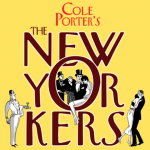
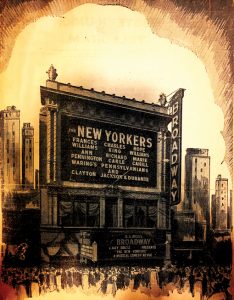 Director John Rando has no trouble with the fact that THE NEW YORKERS is a series of songs with barely enough plot to keep the show from being designated a revue or vaudeville (not that there would be a problem with either one). But Mr. Rando ensures that even with all the numbers being launched in so many ways by different people and acts that everyone gets to shine and nothing ever clashes so that the show buckets along engagingly to its loopy conclusion (the memorable “I Happen To Like New York” chorale). Mr. Chris Bailey’s choreography has a lot to do with this because so much movement and dancing carry THE NEW YORKERS forward. A gangster battle where the machine gun fire is enacted by tap-dance emphasizes the period, plot and cartoonish nature of the show since the assailants and their would-be targets just keep happily tapping and firing. More than that, the specialties are clearly staged to make the most of the talents involved yet invoke their predecessors in the roles. In fact, where many songs have at least a line to cue them in, Messrs. Rando and Viertel know that sometimes a song should be left to fend for itself and ensure that a moment like Ms. Cyrille Aimée’s singing of “Love for Sale” stands alone as the jewel of the show as the original piece did in 1930.
Director John Rando has no trouble with the fact that THE NEW YORKERS is a series of songs with barely enough plot to keep the show from being designated a revue or vaudeville (not that there would be a problem with either one). But Mr. Rando ensures that even with all the numbers being launched in so many ways by different people and acts that everyone gets to shine and nothing ever clashes so that the show buckets along engagingly to its loopy conclusion (the memorable “I Happen To Like New York” chorale). Mr. Chris Bailey’s choreography has a lot to do with this because so much movement and dancing carry THE NEW YORKERS forward. A gangster battle where the machine gun fire is enacted by tap-dance emphasizes the period, plot and cartoonish nature of the show since the assailants and their would-be targets just keep happily tapping and firing. More than that, the specialties are clearly staged to make the most of the talents involved yet invoke their predecessors in the roles. In fact, where many songs have at least a line to cue them in, Messrs. Rando and Viertel know that sometimes a song should be left to fend for itself and ensure that a moment like Ms. Cyrille Aimée’s singing of “Love for Sale” stands alone as the jewel of the show as the original piece did in 1930. Mr. Gordon Stanley is a perfectly peevish Prospector who is driven by oil and cannot see any romance beside it. He fits perfectly in with the Presidents who are played with relish by Messrs. Stephen Mo Hanan, Peter Land and J. Bernard Calloway. All the gentlemen gleefully twirl a metaphysical villainous mustache with panache, bringing their best to their anthem of greed “Just A Little Bit More” and being merrily hissable in “The Spring of Next year” where they exult in the destruction of Paris.
Mr. Gordon Stanley is a perfectly peevish Prospector who is driven by oil and cannot see any romance beside it. He fits perfectly in with the Presidents who are played with relish by Messrs. Stephen Mo Hanan, Peter Land and J. Bernard Calloway. All the gentlemen gleefully twirl a metaphysical villainous mustache with panache, bringing their best to their anthem of greed “Just A Little Bit More” and being merrily hissable in “The Spring of Next year” where they exult in the destruction of Paris. 
 One of the Countess’ aides and links from the harsh real world to her romantic existence is Mr. Lenny Wolpe’s jovial Sewerman. From his number “Pretty Garbage” and onwards Mr. Wolpe creates a man who has his mind in the most delightful of gutters, giving cheerful denials about the outrageous world below that make it seem even more wonderful and fantastic. When the Sewerman gives a “sympathetic” defense of the rich in Act Two, Mr. Wolpe extracts some wonderfully timely comedy out of the moment.
One of the Countess’ aides and links from the harsh real world to her romantic existence is Mr. Lenny Wolpe’s jovial Sewerman. From his number “Pretty Garbage” and onwards Mr. Wolpe creates a man who has his mind in the most delightful of gutters, giving cheerful denials about the outrageous world below that make it seem even more wonderful and fantastic. When the Sewerman gives a “sympathetic” defense of the rich in Act Two, Mr. Wolpe extracts some wonderfully timely comedy out of the moment.  makes a beautiful Mute – the observer of all and assistant to the Countess. For a man who will not speak, Mr. Kristopher Thompson-Bolden’s Mute is a real chatty soul and can even deliver a song with flair – allowing gesture and dance to supply the lyrics that are then picked up and sung by the other performers.
makes a beautiful Mute – the observer of all and assistant to the Countess. For a man who will not speak, Mr. Kristopher Thompson-Bolden’s Mute is a real chatty soul and can even deliver a song with flair – allowing gesture and dance to supply the lyrics that are then picked up and sung by the other performers. Two other Madwomen assist the Countess: Ms. Alison Fraser gives us a striking and memorable Madame Constance, Madwoman of the Market. She could have jauntily stepped out of an Edward Gorey drawing but her fancies are less gothic and more aurally and erotically absurd.
Two other Madwomen assist the Countess: Ms. Alison Fraser gives us a striking and memorable Madame Constance, Madwoman of the Market. She could have jauntily stepped out of an Edward Gorey drawing but her fancies are less gothic and more aurally and erotically absurd.
